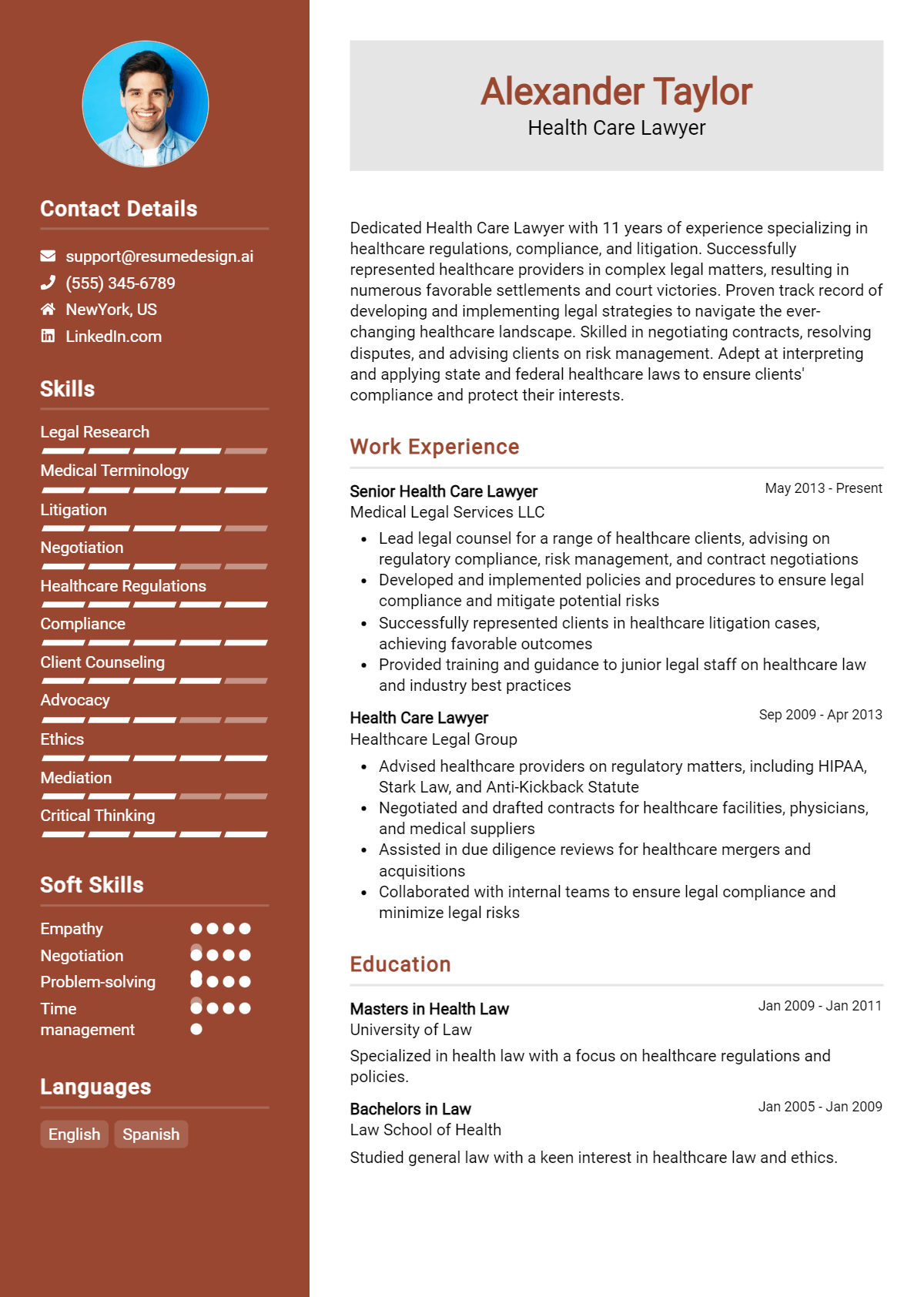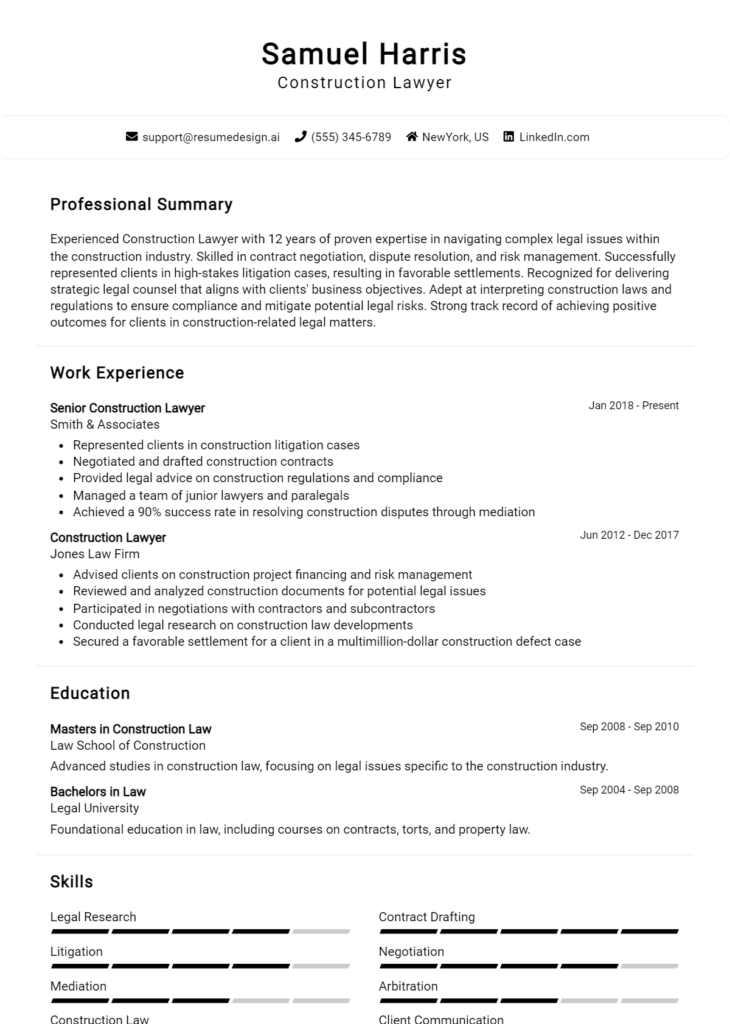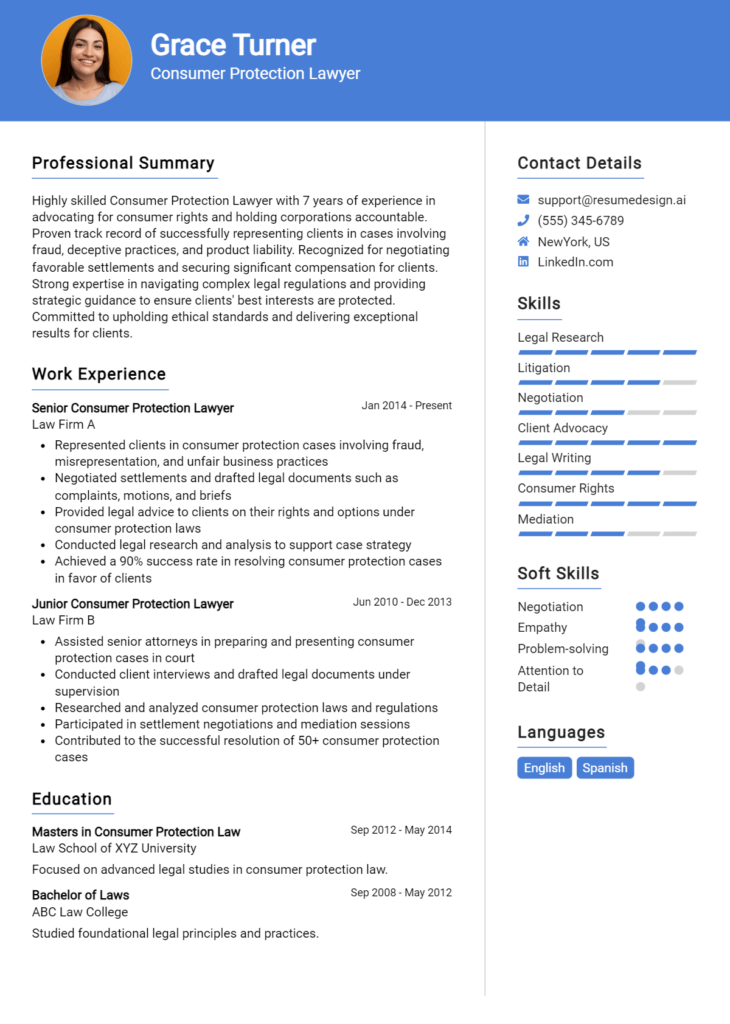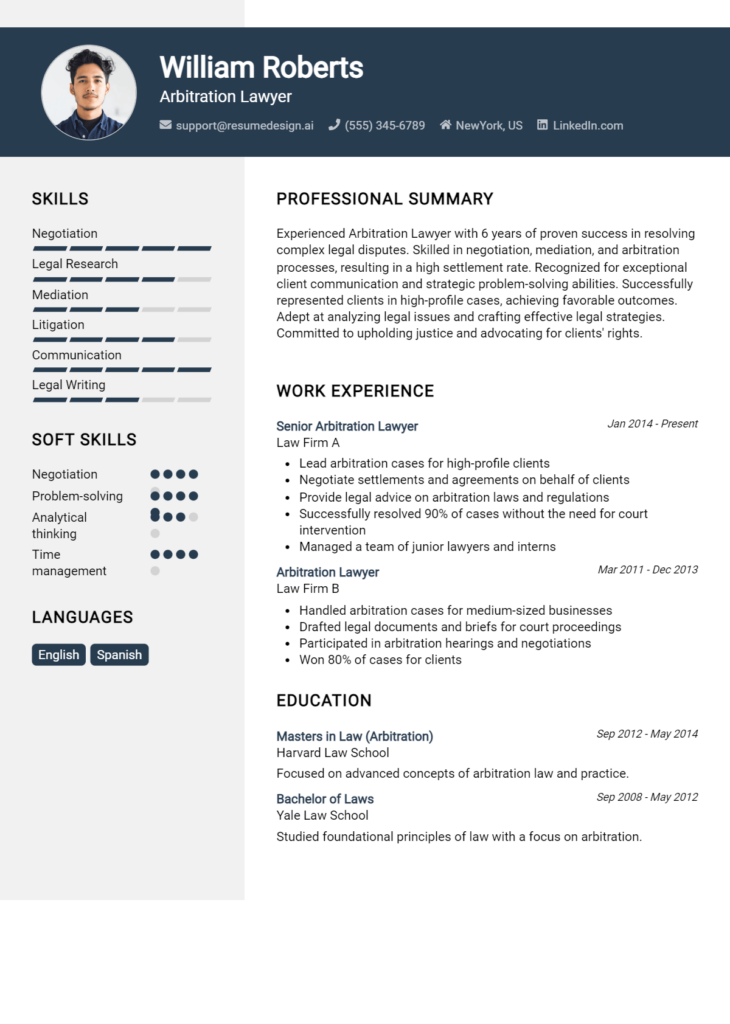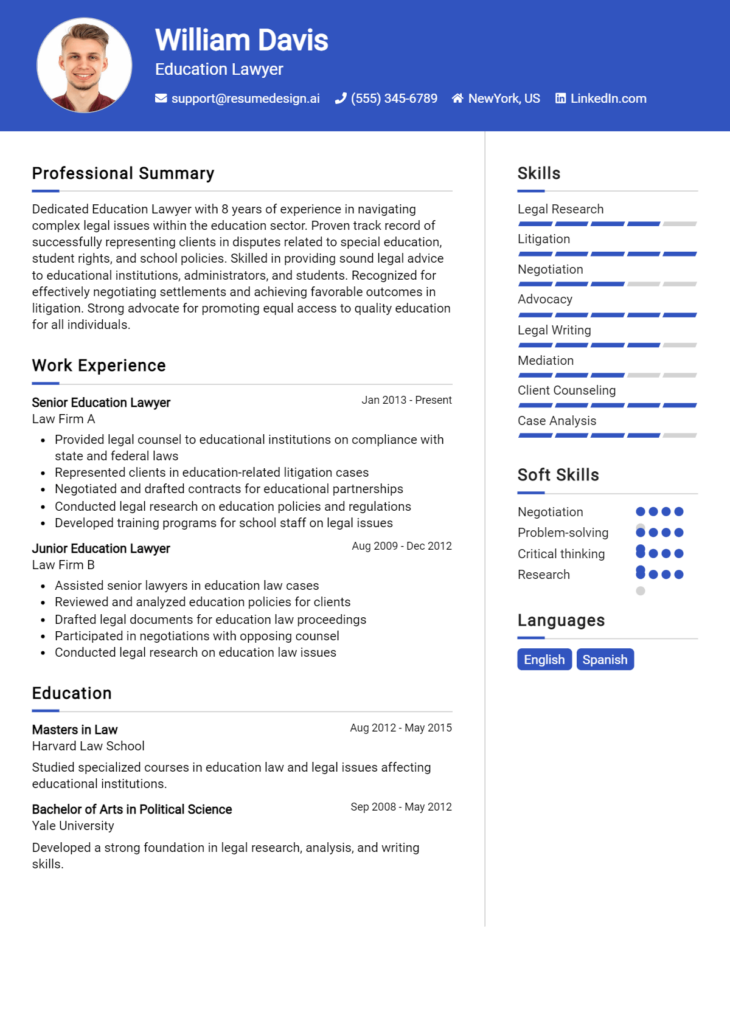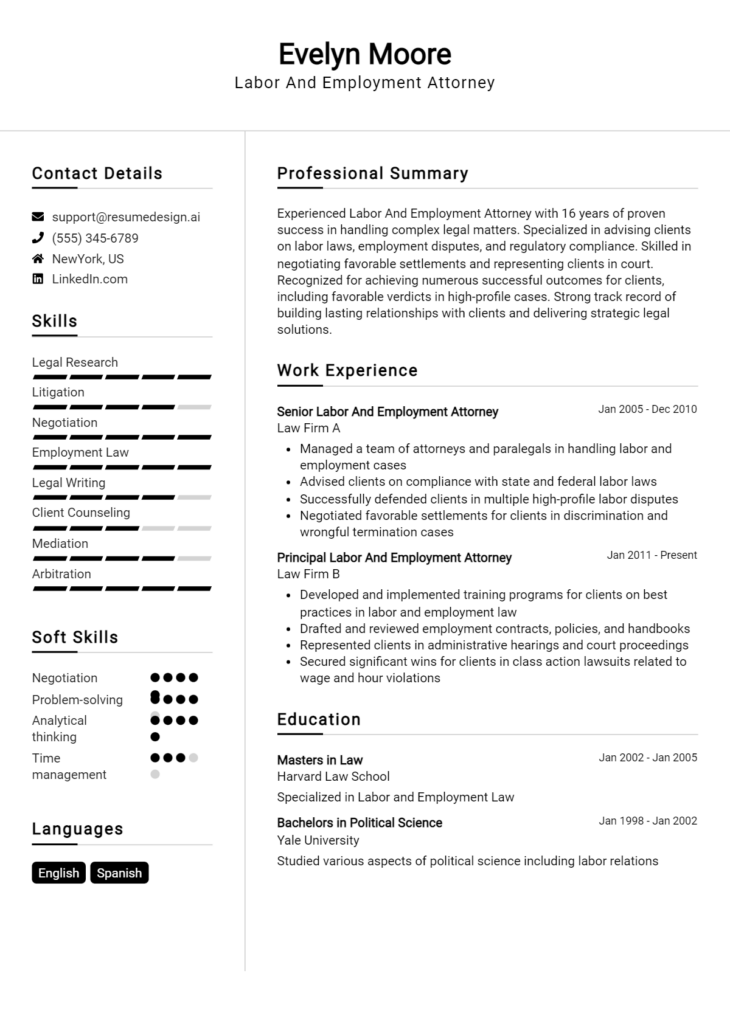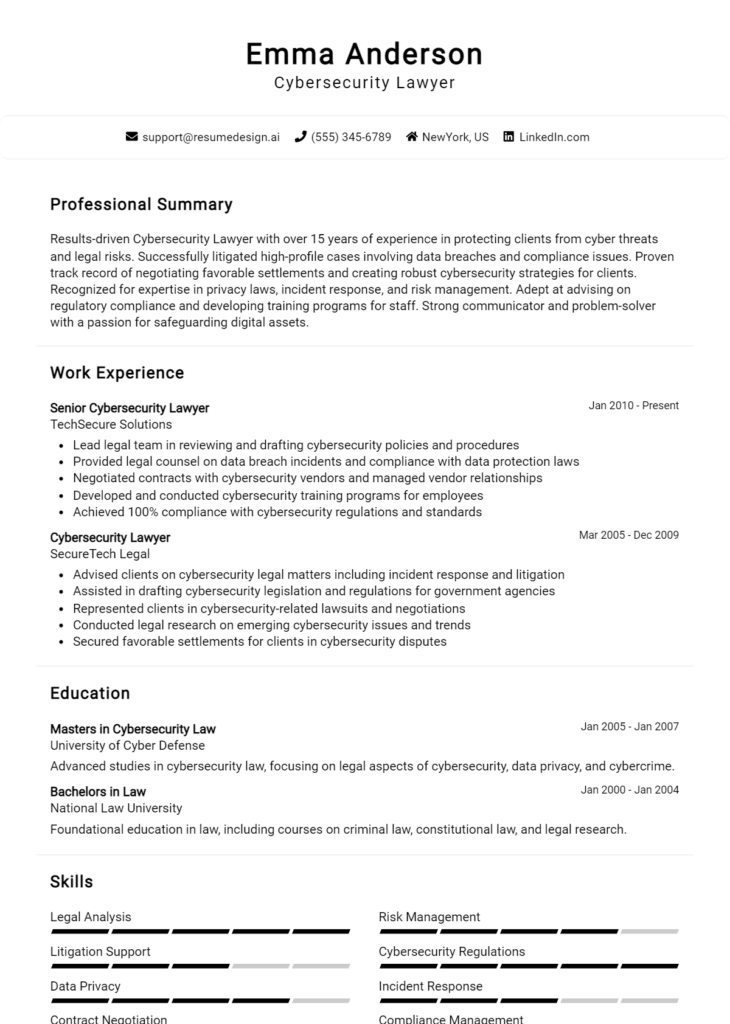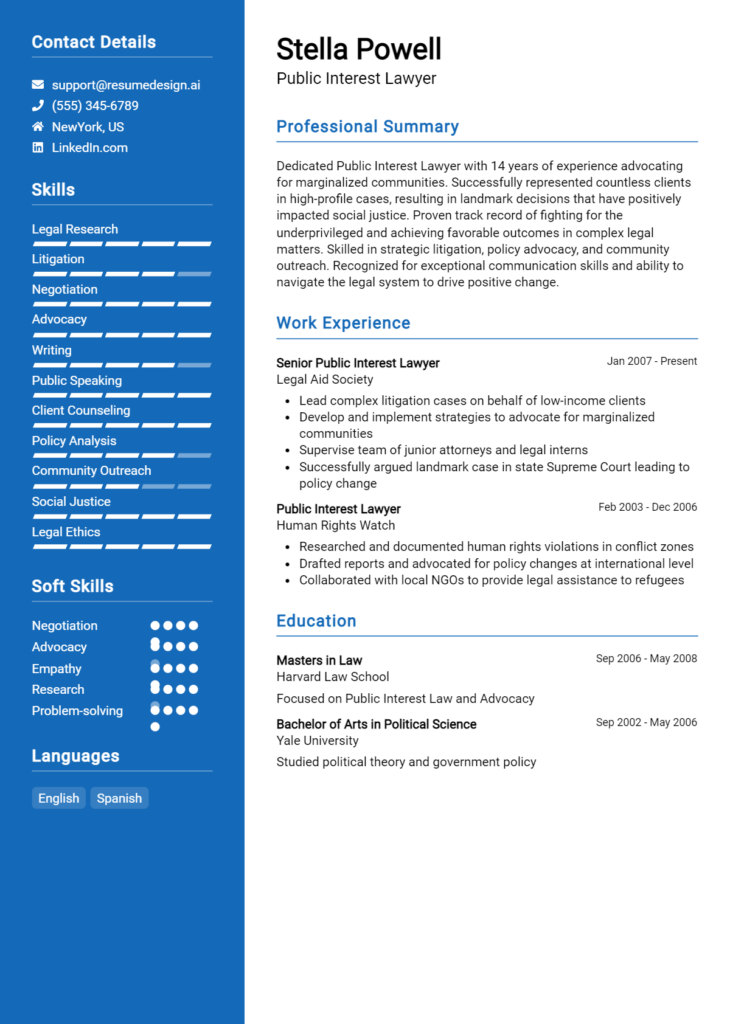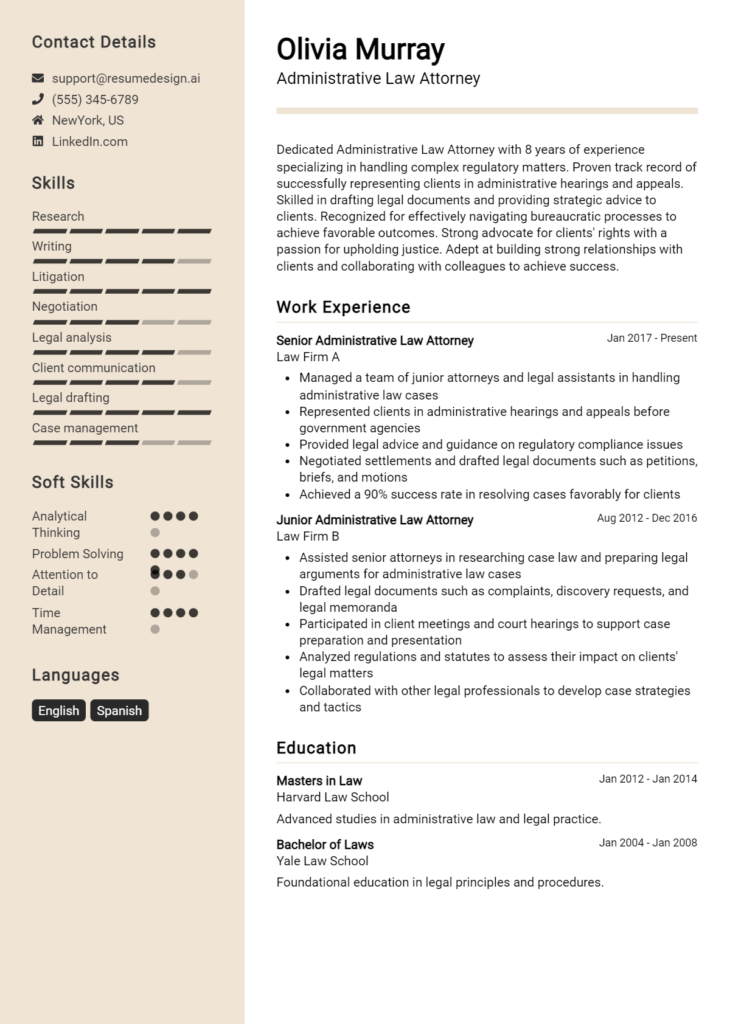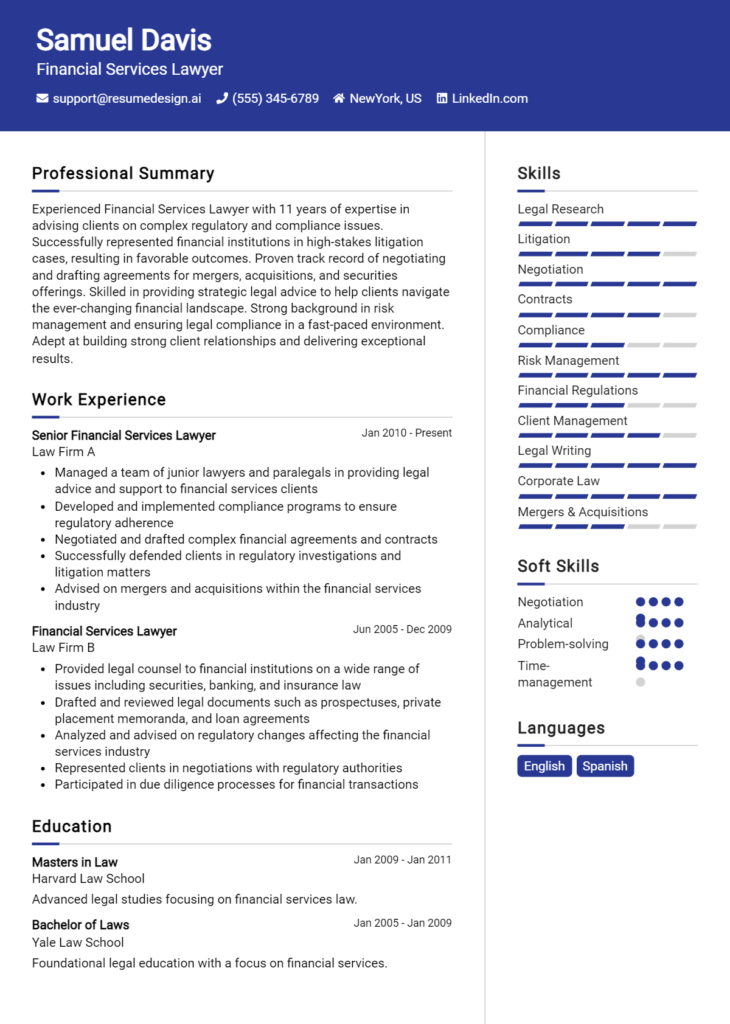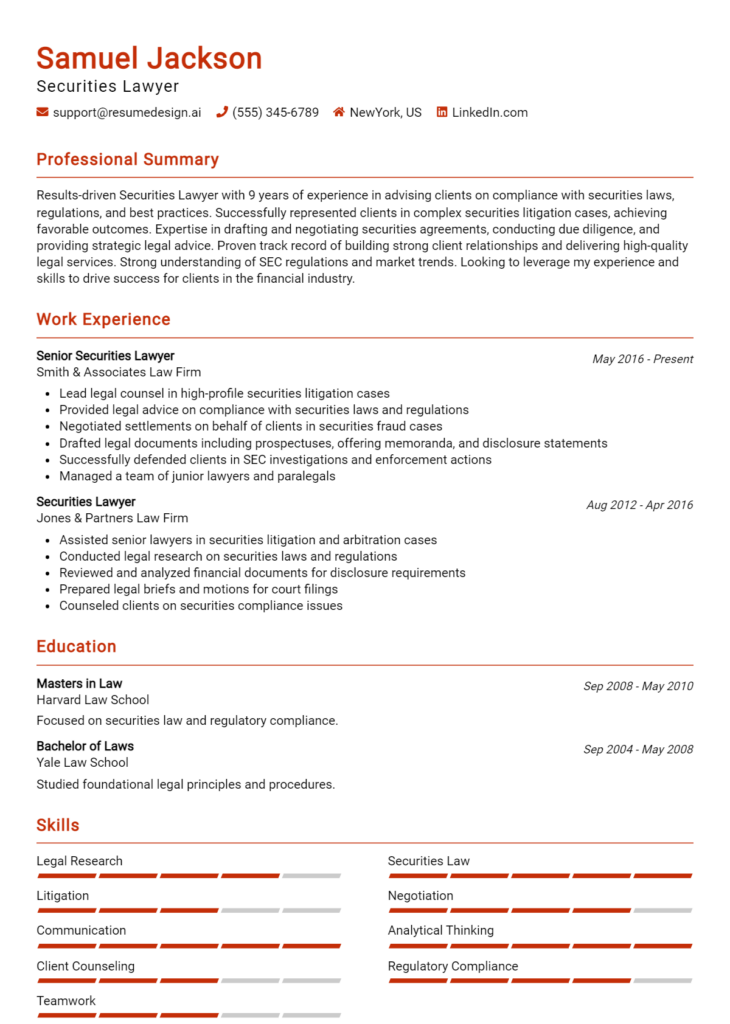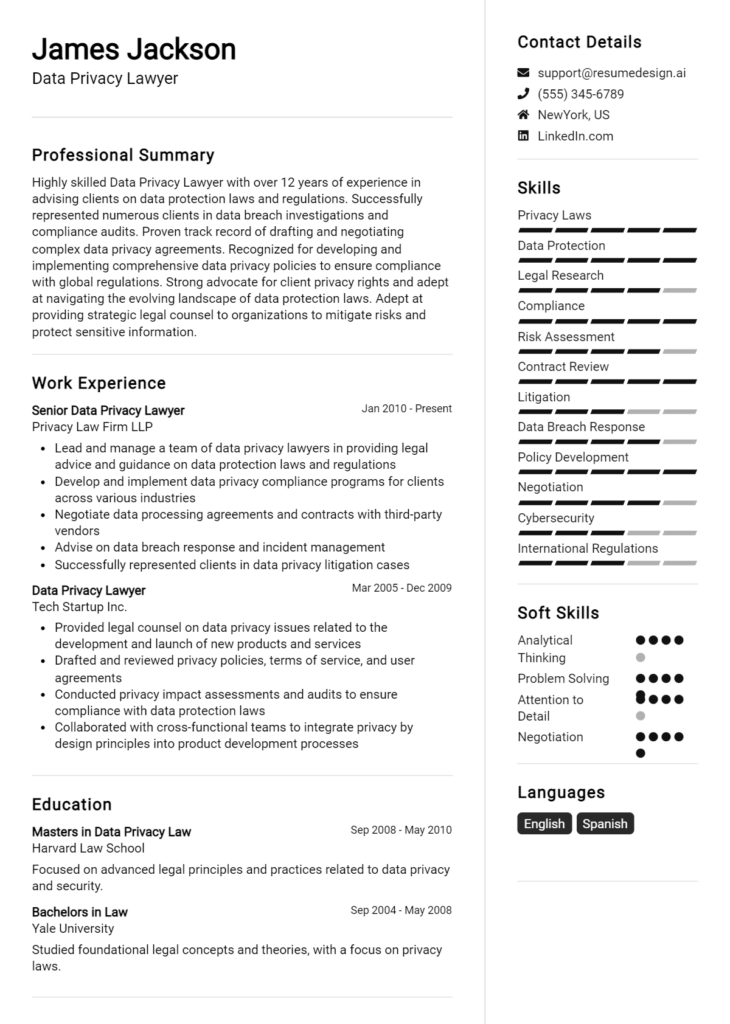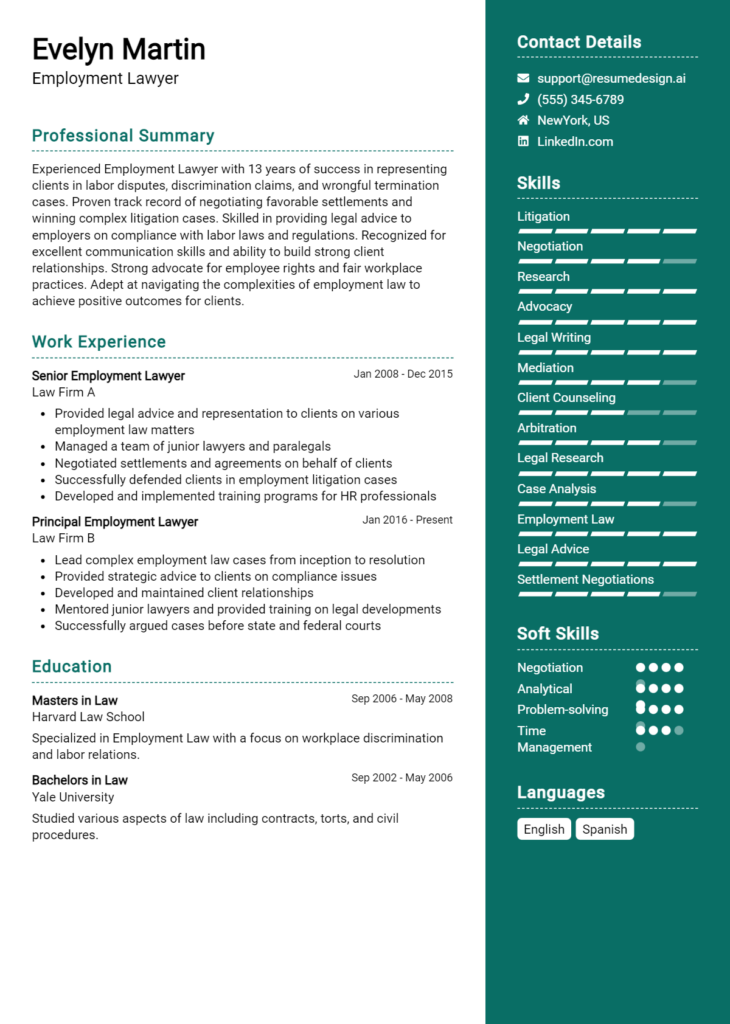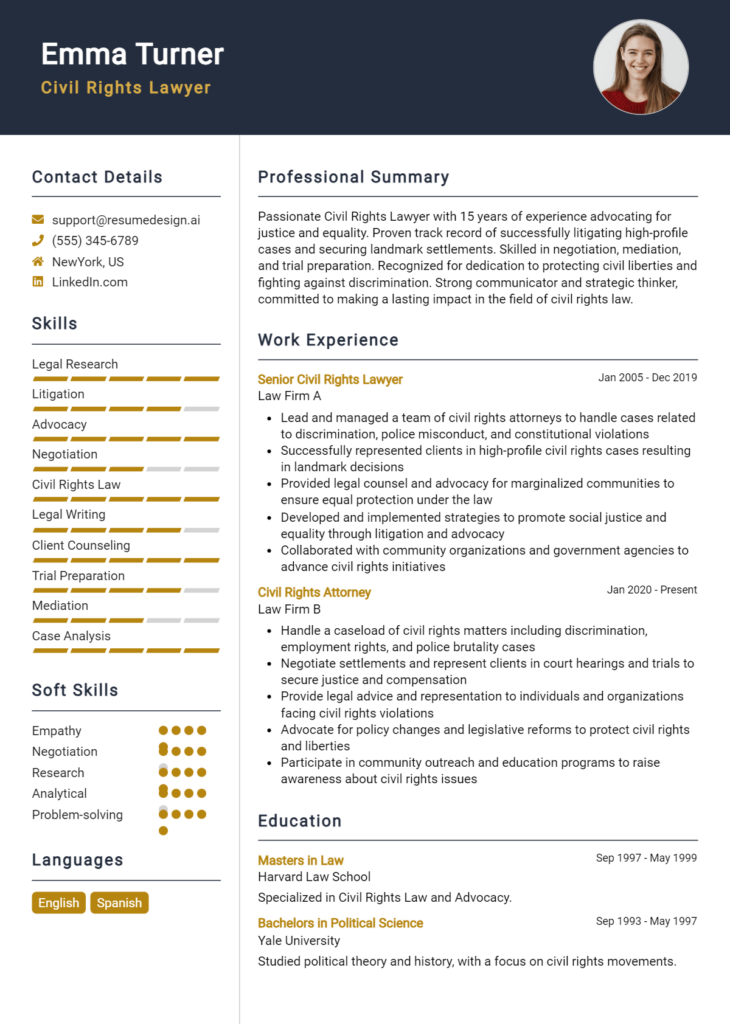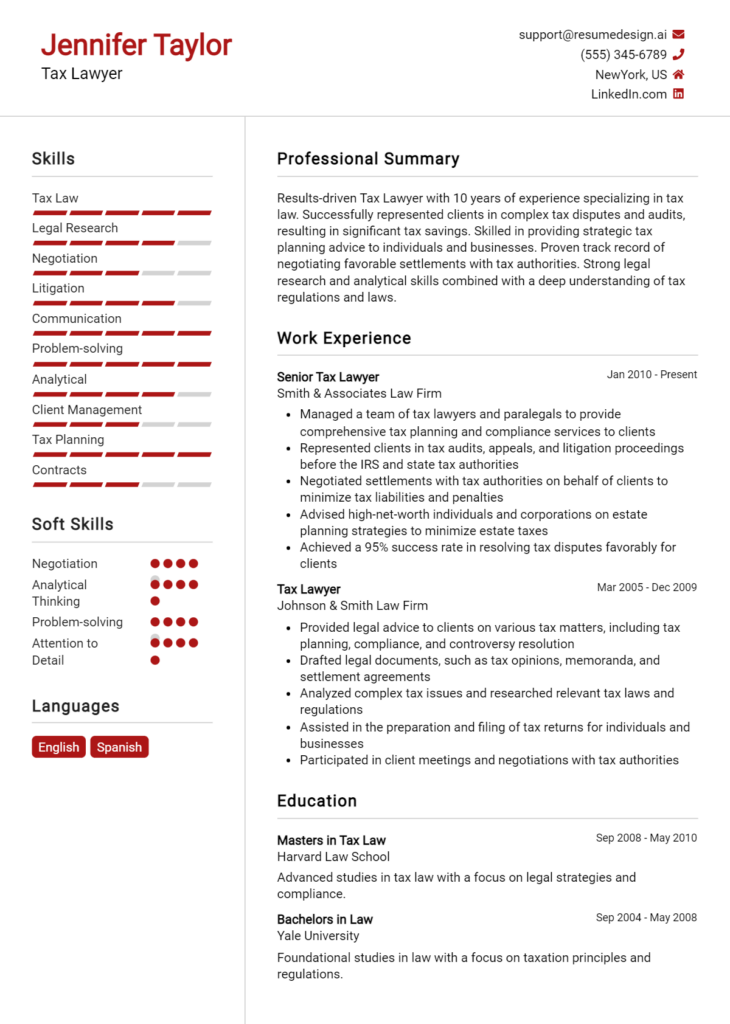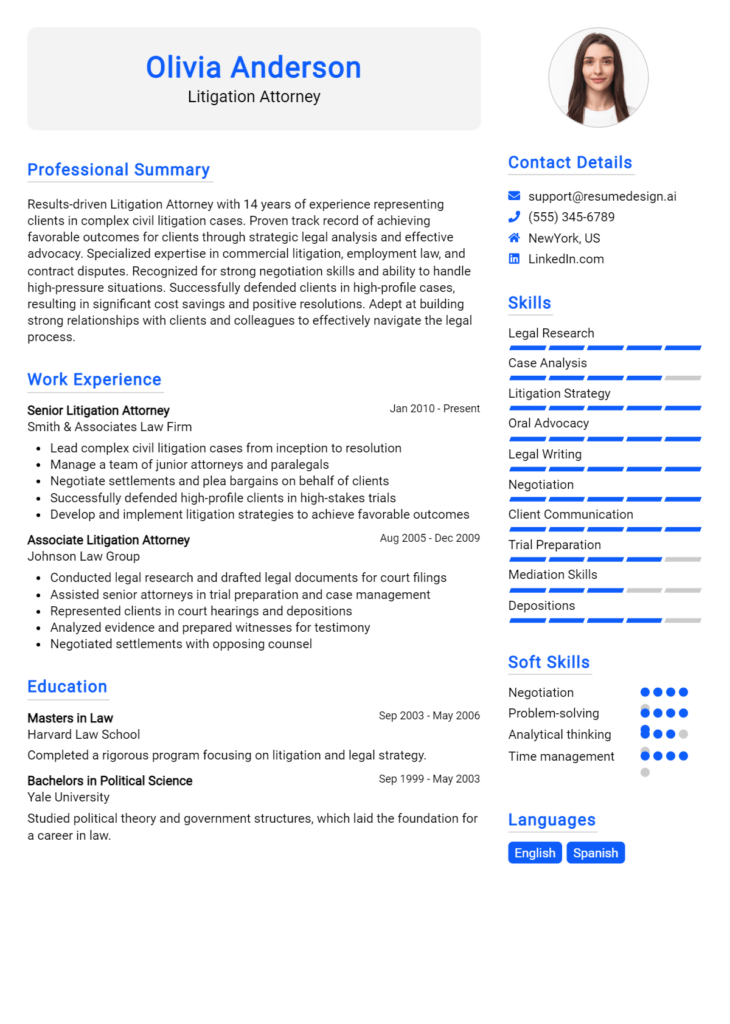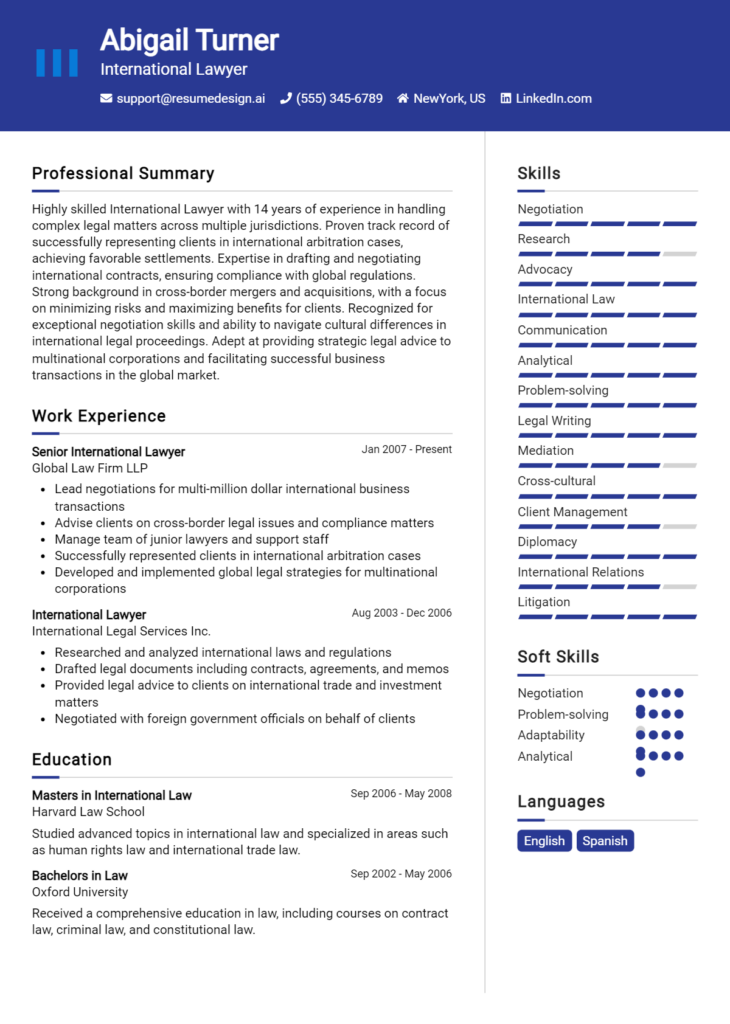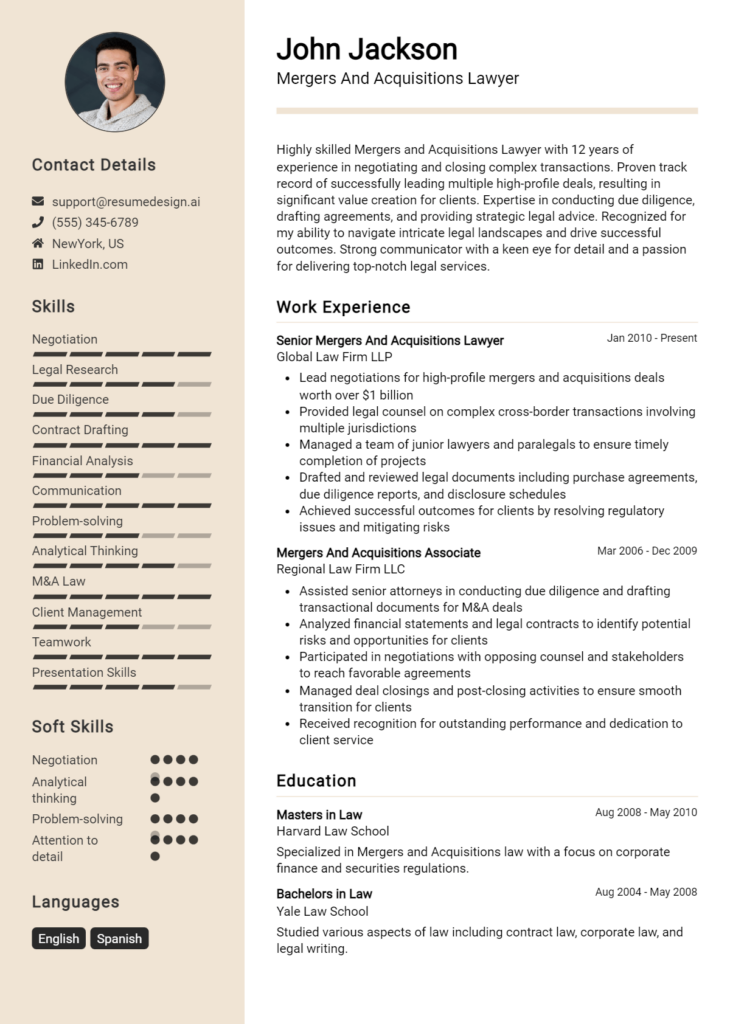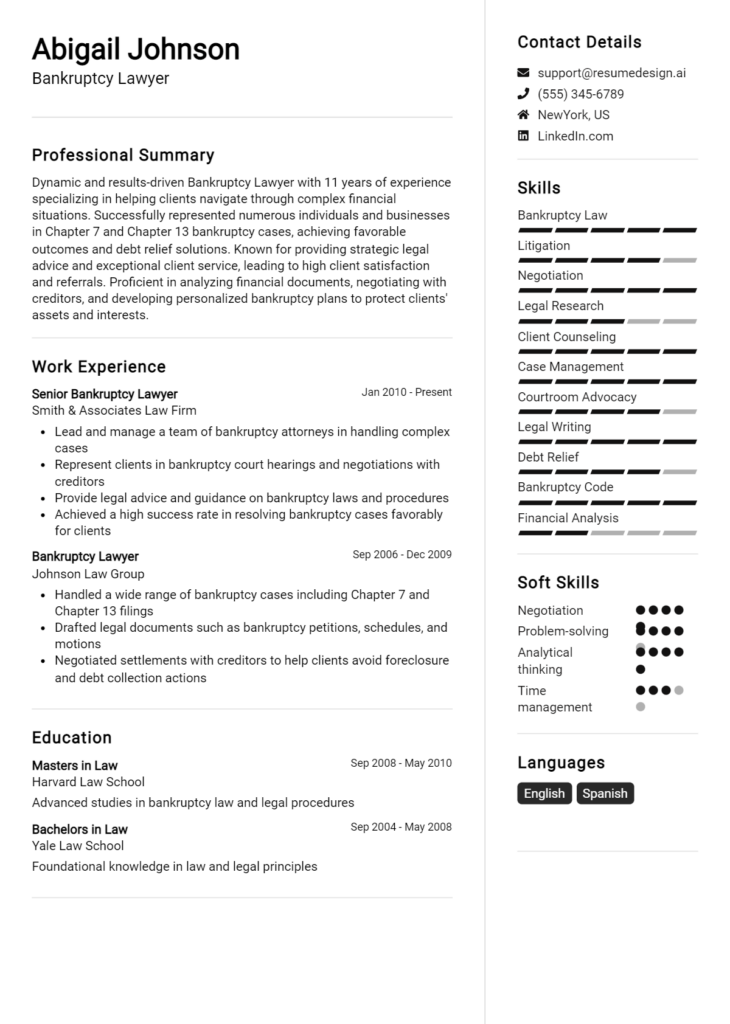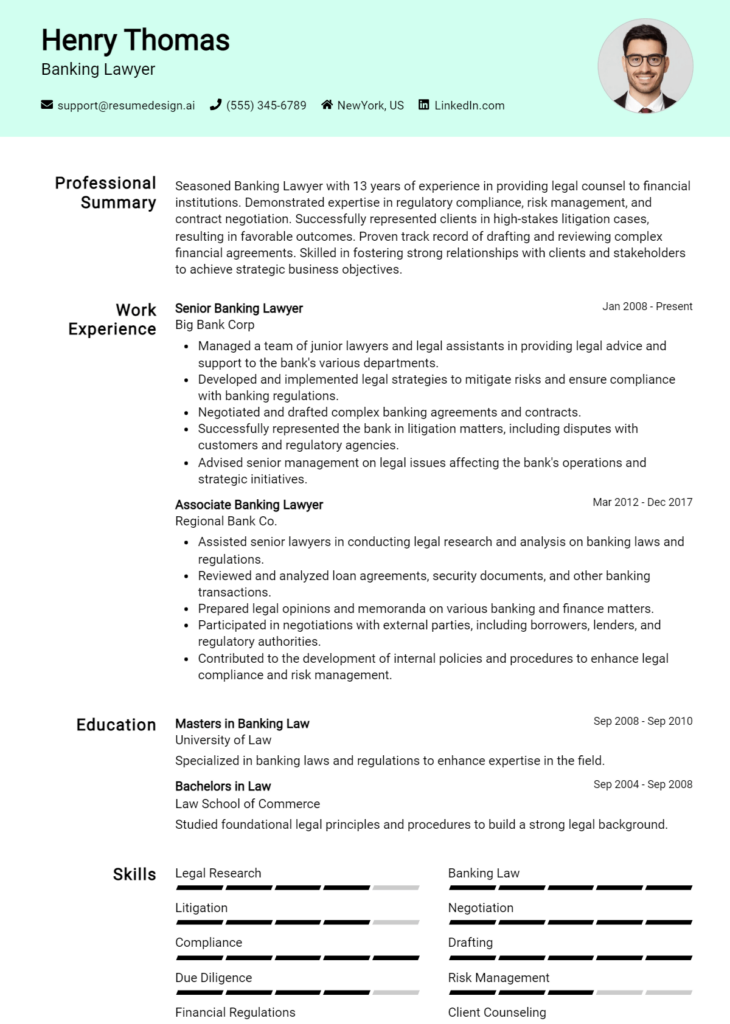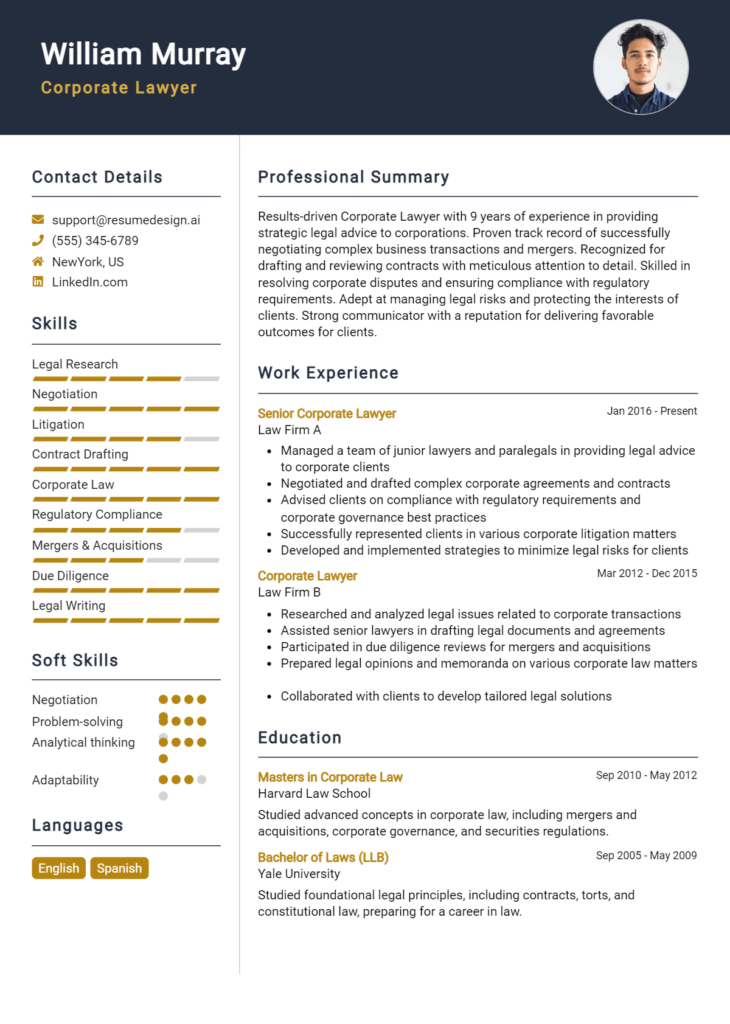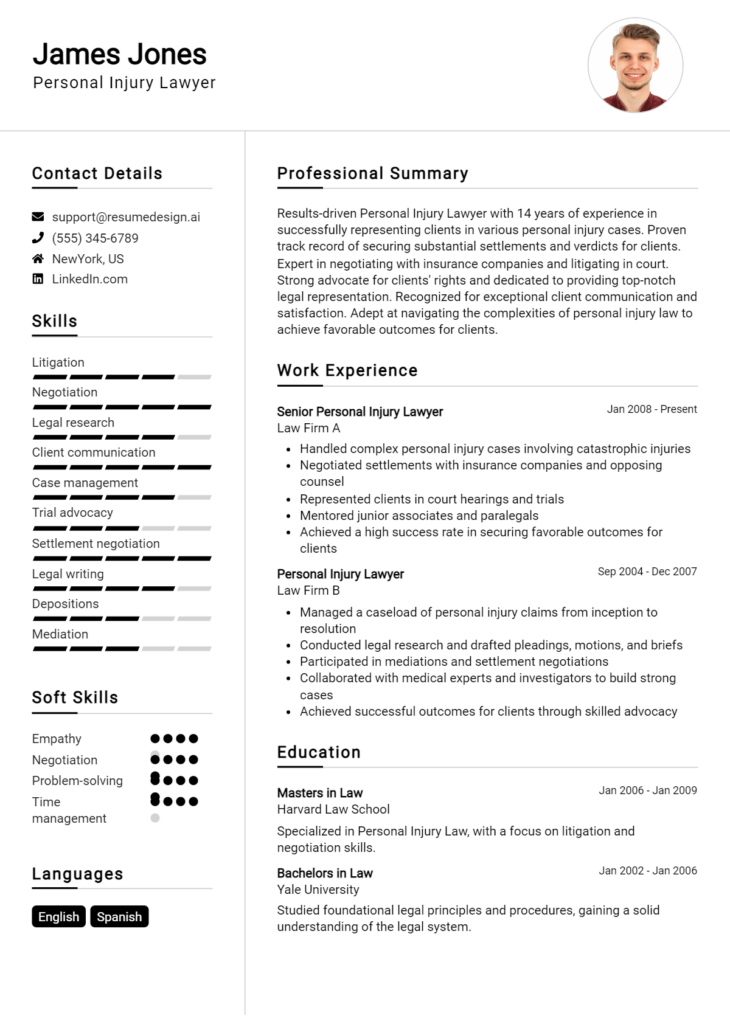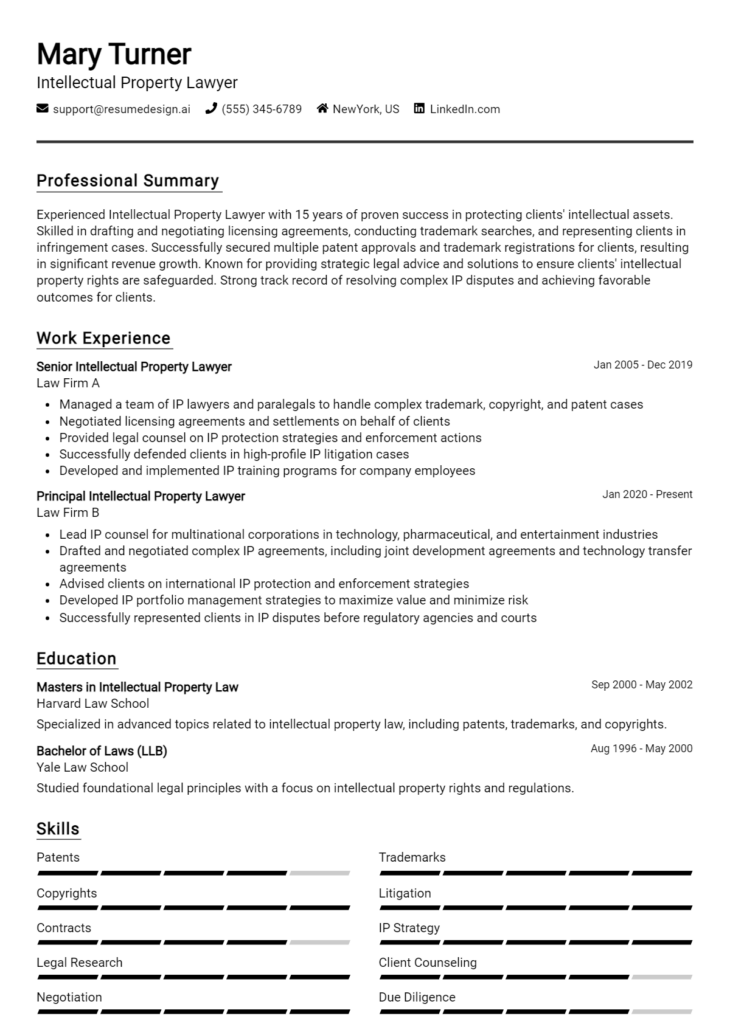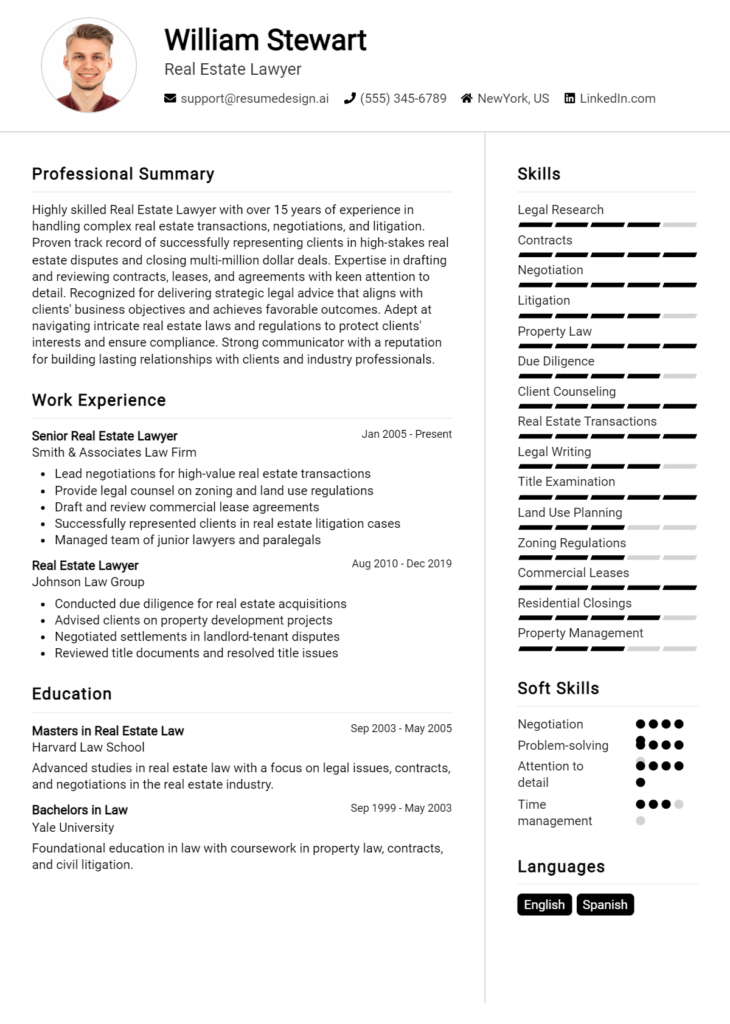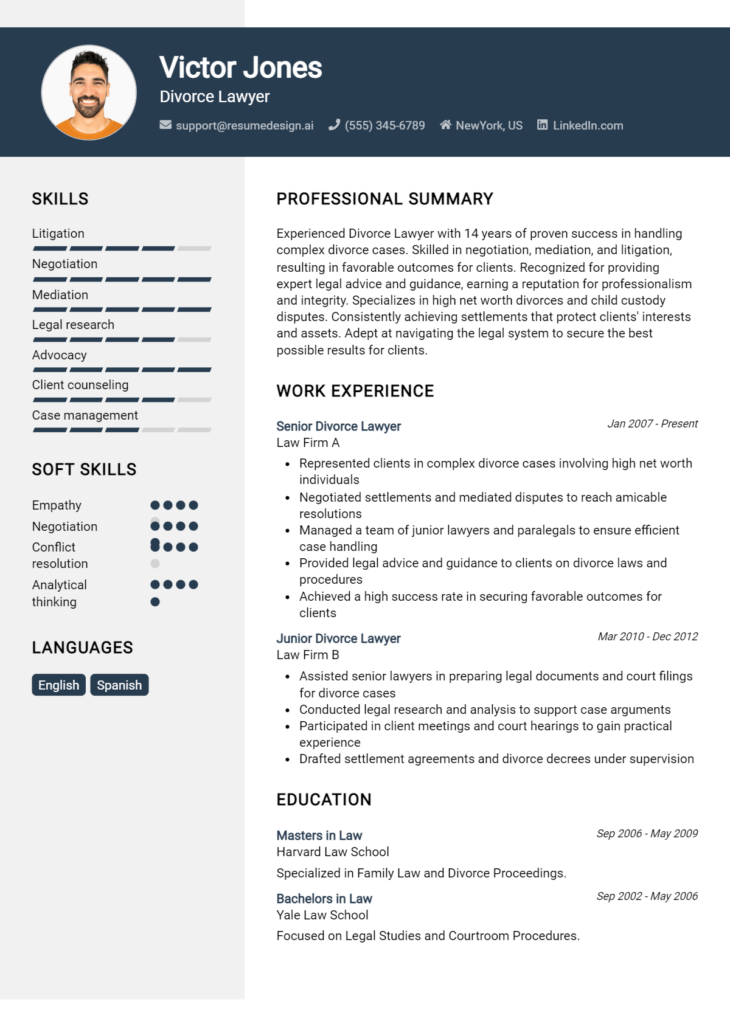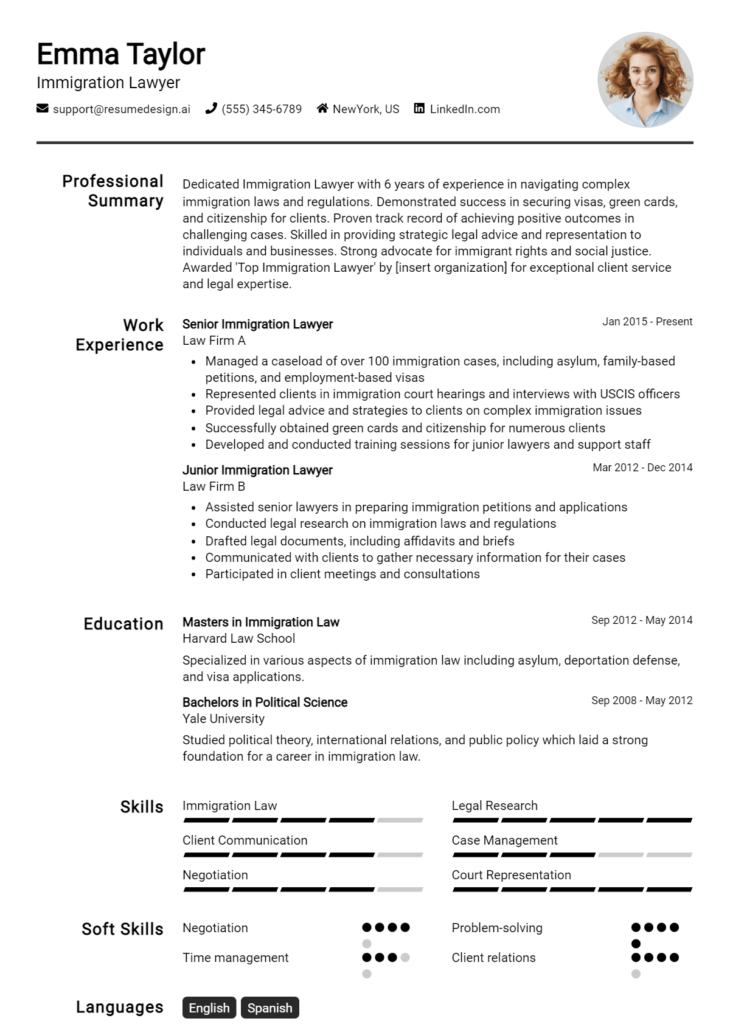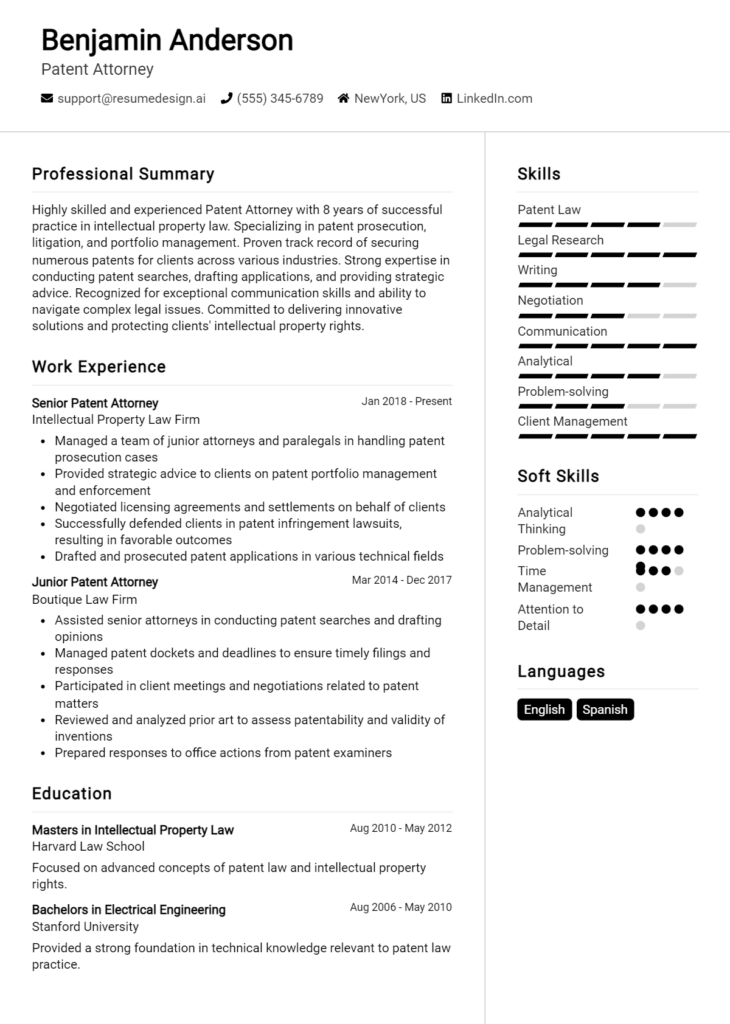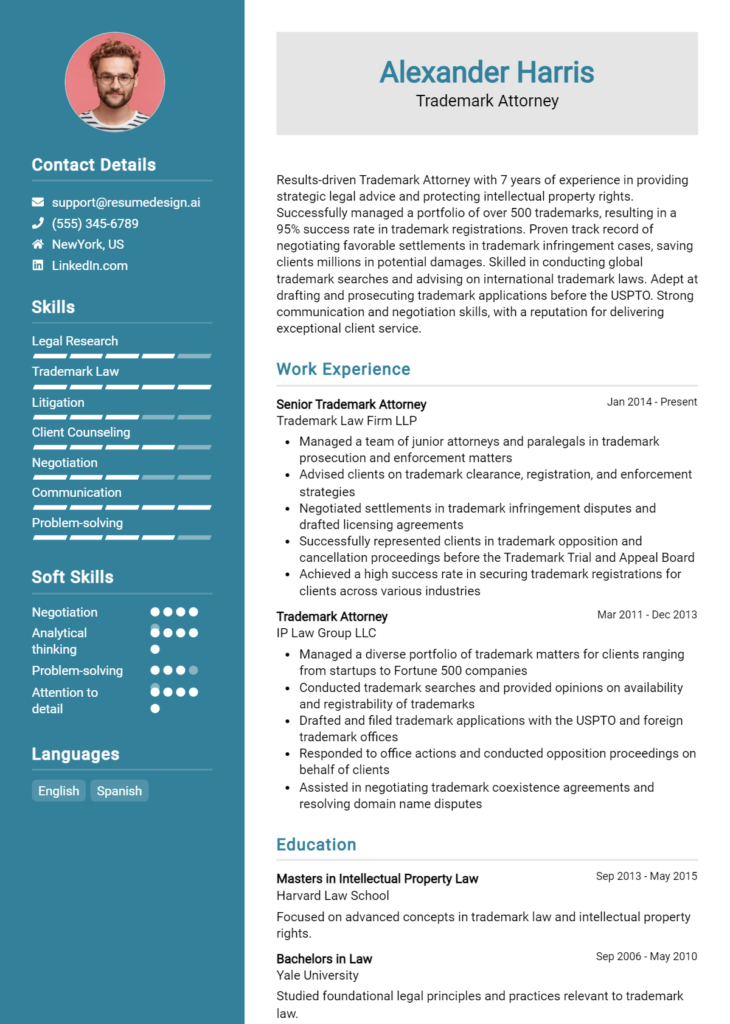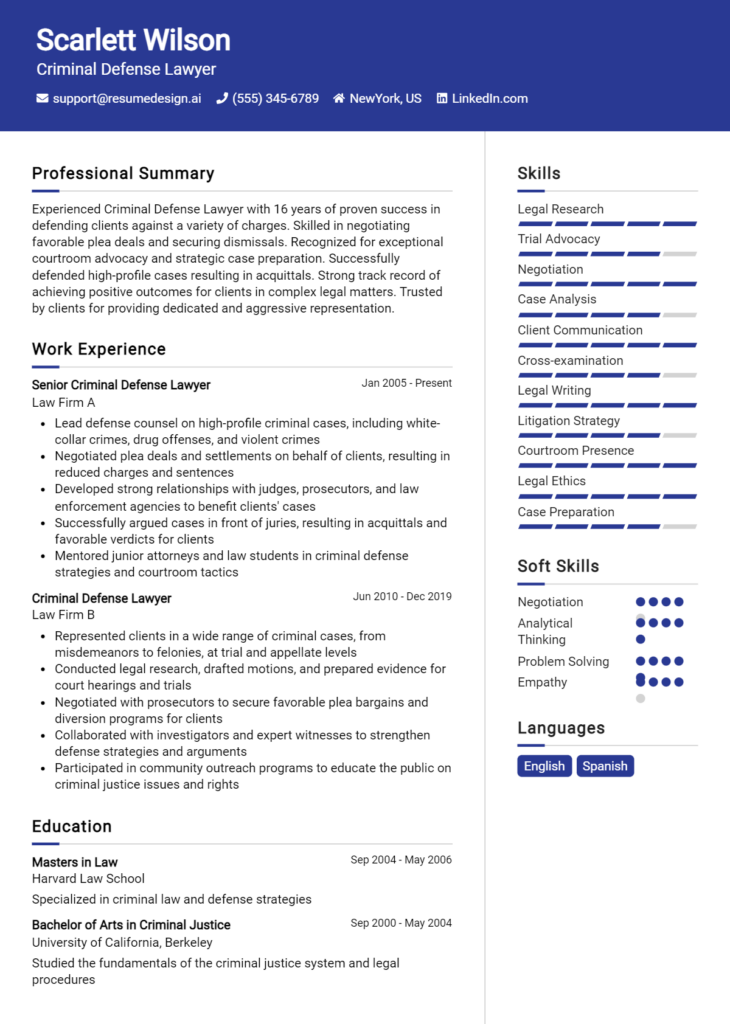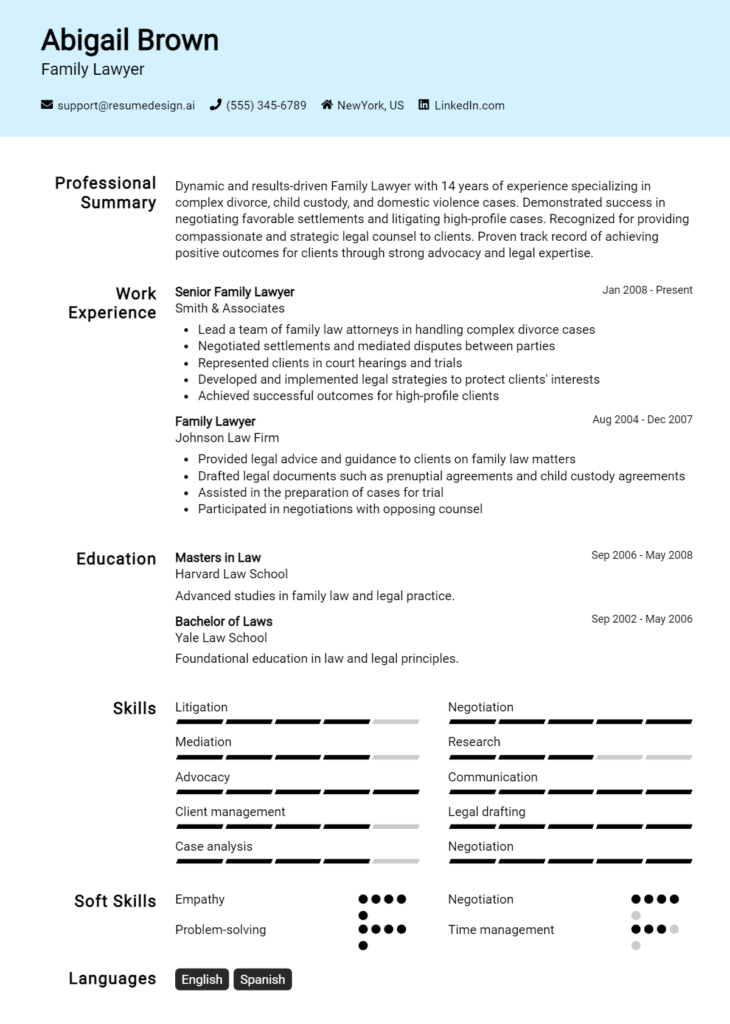Health Care Lawyer Core Responsibilities
A Health Care Lawyer plays a vital role in navigating the complex legal landscape of the healthcare industry. Key responsibilities include ensuring compliance with regulations, advising on healthcare policies, and representing clients in legal disputes. This role requires strong technical knowledge, operational insight, and exceptional problem-solving skills to bridge the gap between legal and healthcare departments. A well-structured resume can effectively showcase these qualifications, emphasizing how they contribute to the organization’s overall goals, such as maintaining legal integrity and enhancing patient care.
Common Responsibilities Listed on Health Care Lawyer Resume
- Advising healthcare providers on legal compliance and regulatory issues.
- Drafting and reviewing contracts for healthcare services.
- Representing clients in administrative hearings and litigation.
- Conducting legal research on healthcare laws and regulations.
- Negotiating settlements in healthcare-related disputes.
- Staying updated on changes in healthcare legislation.
- Providing guidance on patient privacy and data protection laws.
- Collaborating with healthcare professionals to develop policies.
- Training staff on legal compliance and risk management.
- Advising on issues related to medical malpractice and liability.
- Reviewing and negotiating insurance issues related to healthcare.
High-Level Resume Tips for Health Care Lawyer Professionals
In the competitive field of health care law, a well-crafted resume is crucial for making a strong first impression. Your resume is often the initial point of contact with potential employers, and it serves as a reflection of your professional skills, achievements, and dedication to the field. As a Health Care Lawyer, your resume must effectively communicate your expertise in navigating complex legal and regulatory frameworks while showcasing your relevant experiences. This guide will provide practical and actionable resume tips that are specifically tailored for Health Care Lawyer professionals, helping you stand out in a crowded job market.
Top Resume Tips for Health Care Lawyer Professionals
- Tailor your resume to each job description by incorporating specific keywords and phrases from the posting.
- Highlight relevant experience in health care law, such as compliance, litigation, and regulatory issues.
- Quantify your achievements, using metrics where possible, to demonstrate the impact of your work.
- Showcase industry-specific skills, such as knowledge of HIPAA, medical malpractice laws, and insurance regulations.
- Include any relevant certifications or memberships in professional organizations related to health care law.
- Utilize a clear and professional format that makes your resume easy to read and visually appealing.
- Incorporate a strong summary statement at the beginning to capture the essence of your qualifications and career goals.
- Emphasize your ability to work collaboratively with healthcare professionals and other legal advisors.
- List continuing education or training that reflects your commitment to staying updated in the evolving health care landscape.
By implementing these tips, you can significantly enhance your chances of landing a job in the Health Care Lawyer field. A targeted and polished resume not only highlights your qualifications but also demonstrates your understanding of the unique challenges and responsibilities within the healthcare legal framework, making you a compelling candidate for potential employers.
Why Resume Headlines & Titles are Important for Health Care Lawyer
In the competitive field of health care law, a well-crafted resume headline or title serves as the first impression a candidate makes on hiring managers. It is crucial because it not only captures attention but also succinctly summarizes the candidate's key qualifications and areas of expertise in a single impactful phrase. A strong headline should be concise, relevant, and directly related to the specific job being applied for, allowing hiring managers to quickly assess the candidate’s alignment with the role. The right choice of words can differentiate a candidate from the rest of the applicants, paving the way for further consideration in the hiring process.
Best Practices for Crafting Resume Headlines for Health Care Lawyer
- Keep it concise: Aim for a headline that is no longer than one to two lines.
- Be role-specific: Tailor your headline to reflect the specific position you are applying for.
- Highlight key strengths: Include your most relevant skills or accomplishments that set you apart.
- Use industry keywords: Incorporate terminology common in health care law to align with job descriptions.
- Focus on results: If possible, quantify achievements to showcase your impact in previous roles.
- Avoid clichés: Steer clear of overused phrases that don’t add unique value to your profile.
- Make it compelling: Use action-oriented language that conveys confidence and expertise.
- Align with the job description: Ensure your headline reflects the requirements and expectations outlined in the job posting.
Example Resume Headlines for Health Care Lawyer
Strong Resume Headlines
"Experienced Health Care Lawyer Specializing in Compliance and Regulatory Issues"
“Results-Driven Attorney with 10+ Years in Health Care Litigation and Contract Negotiation”
“Dynamic Health Law Expert Focused on Patient Rights and Health Policy Advocacy”
Weak Resume Headlines
“Lawyer Looking for Opportunities”
“Experienced Professional in Legal Matters”
The strong headlines are effective because they immediately communicate the candidate's expertise and specific focus within health care law, drawing in the reader with precise and powerful language. They highlight relevant experience and skills, making it clear why the candidate should be considered for the role. In contrast, the weak headlines fail to make an impact as they lack specificity and do not convey the candidate's unique qualifications or areas of expertise, making them easily forgettable in a sea of applicants.
Writing an Exceptional Health Care Lawyer Resume Summary
A resume summary is a critical component for a Health Care Lawyer, as it serves as the first impression a candidate makes on hiring managers. A well-crafted summary quickly captures attention by highlighting essential skills, relevant experience, and significant accomplishments that align with the specific requirements of the job. This concise and impactful statement should be tailored to the position, offering a snapshot of the candidate's qualifications and demonstrating their value to potential employers. A strong summary not only piques interest but also lays the groundwork for the rest of the resume, paving the way for further consideration.
Best Practices for Writing a Health Care Lawyer Resume Summary
- Quantify Achievements: Use specific numbers and outcomes to illustrate your successes.
- Focus on Key Skills: Highlight relevant legal expertise, negotiation skills, and knowledge of health care regulations.
- Tailor for the Job Description: Customize your summary to reflect the specific requirements and language of the job listing.
- Be Concise: Keep your summary to 2-4 sentences, ensuring it is direct and impactful.
- Showcase Unique Selling Points: Identify what sets you apart from other candidates, such as specialized certifications or notable case wins.
- Use Active Language: Start sentences with strong action verbs to convey confidence and decisiveness.
- Include Relevant Experience: Mention specific areas of health care law you have worked in, such as compliance, litigation, or regulatory matters.
- Maintain Professional Tone: Ensure the summary reflects professionalism and expertise expected in the legal field.
Example Health Care Lawyer Resume Summaries
Strong Resume Summaries
Dynamic Health Care Lawyer with over 8 years of experience in regulatory compliance and litigation, successfully representing clients in over 50 cases, resulting in a 95% success rate. Proven track record in navigating complex health care laws and advocating for patient rights.
Results-oriented attorney specializing in health care law with a focus on contract negotiation and risk management. Achieved a 30% reduction in legal costs for clients through strategic planning and effective dispute resolution in high-stakes negotiations.
Detail-oriented Health Care Lawyer with expertise in Medicare and Medicaid regulations. Successfully advised health care providers on compliance issues, leading to a 40% increase in compliance with federal regulations over three years.
Weak Resume Summaries
Experienced lawyer with a focus on health care law. I have worked on many cases and am knowledgeable about various legal issues.
Health Care Lawyer looking for a new opportunity. I have a solid background in law and am interested in helping clients with health care matters.
The strong resume summaries are considered effective because they provide specific details about the candidate's experience, quantify achievements, and directly relate to the skills and responsibilities associated with a Health Care Lawyer role. In contrast, the weak summaries are vague and lack concrete examples or measurable outcomes, making them less compelling and memorable to hiring managers.
Work Experience Section for Health Care Lawyer Resume
The work experience section of a Health Care Lawyer's resume is crucial in demonstrating the candidate's technical skills, leadership abilities, and commitment to delivering high-quality legal services within the health care sector. This section not only highlights the candidate’s legal expertise and knowledge of health regulations but also showcases their capacity to manage teams effectively and navigate complex legal challenges. By quantifying achievements and aligning their experiences with industry standards, candidates can present a compelling narrative that illustrates their value to potential employers, making this section a pivotal element of the resume.
Best Practices for Health Care Lawyer Work Experience
- Use specific legal terminology relevant to health care law to demonstrate expertise.
- Quantify achievements with metrics, such as the number of successful cases handled or settlements reached.
- Highlight experience in managing cross-functional teams and collaborating with health care professionals.
- Detail your role in significant legal projects or cases that had a measurable impact on the organization.
- Include ongoing professional development activities, such as certifications or specialized training in health care law.
- Focus on outcomes rather than just responsibilities, emphasizing how your contributions improved efficiency or compliance.
- Tailor your experiences to match the job description and requirements of the position you are applying for.
- Utilize action verbs to convey a sense of dynamism and leadership in your past roles.
Example Work Experiences for Health Care Lawyer
Strong Experiences
- Successfully negotiated a $2 million settlement for a health care client, reducing potential liabilities by 40%.
- Led a team of 5 attorneys in a high-stakes litigation case, resulting in a favorable verdict that set a precedent in health care law.
- Developed compliance protocols that improved regulatory adherence by 30%, significantly reducing audit findings for a major health care provider.
- Collaborated with hospital administrators to draft and implement policies that enhanced patient confidentiality practices, resulting in a 25% decrease in compliance violations.
Weak Experiences
- Worked on various legal cases related to health care.
- Assisted in drafting legal documents for health care clients.
- Participated in team meetings regarding health care law.
- Provided advice on legal issues in health care settings.
The examples of strong experiences are considered effective because they provide clear, quantifiable outcomes and demonstrate the candidate's leadership and collaborative skills, showcasing their direct impact on organizations. In contrast, the weak experiences lack specificity, detail, and measurable results, making it difficult for potential employers to gauge the candidate's true contributions and capabilities in the field of health care law.
Education and Certifications Section for Health Care Lawyer Resume
The education and certifications section of a Health Care Lawyer's resume is vital in showcasing the candidate's academic qualifications, specialized training, and commitment to continuous learning within the ever-evolving health care law landscape. This section not only provides evidence of the candidate's foundational knowledge and expertise but also reflects their proactive efforts to stay updated with industry trends and legal standards. By including relevant coursework, industry-recognized certifications, and specialized training, candidates can significantly enhance their credibility and demonstrate their alignment with the specific demands of the job role.
Best Practices for Health Care Lawyer Education and Certifications
- List degrees in reverse chronological order, starting with the most recent.
- Include relevant coursework that pertains directly to health care law, such as "Health Law," "Medical Ethics," or "Regulatory Compliance."
- Highlight any industry-recognized certifications, such as Board Certification in Health Care Law or a certification from the American Health Lawyers Association.
- Provide details about specialized training, such as workshops or seminars focused on recent health care regulations or legal updates.
- Emphasize advanced degrees, such as an LL.M. in Health Law, to demonstrate a higher level of expertise.
- Avoid listing irrelevant degrees or certifications that do not pertain to health care law.
- Include honors or awards received during your educational journey that relate to health care or law.
- Keep the section concise, ensuring it is easy to read and focuses on the most impactful information.
Example Education and Certifications for Health Care Lawyer
Strong Examples
- Juris Doctor (J.D.), Harvard Law School, Concentration in Health Law, 2020
- LL.M. in Health Law, University of California, Los Angeles (UCLA), 2021
- Certified in Health Care Compliance (CHC), Health Care Compliance Association, 2022
- Coursework in Medical Malpractice Law and Regulatory Compliance, Yale Law School
Weak Examples
- Bachelor of Arts in English Literature, State University, 2015
- Certification in Personal Injury Law, 2019
- Online Course in Social Media Marketing, 2020
- Associate Degree in Business Administration, Community College, 2016
The examples are considered strong because they directly align with the qualifications and skills required for a Health Care Lawyer, showcasing relevant degrees, specialized training, and certifications that enhance professional credibility. In contrast, the weak examples reflect educational qualifications and certifications that are either outdated, irrelevant to health care law, or not recognized within the industry, which could detract from the candidate's overall appeal to potential employers.
Top Skills & Keywords for Health Care Lawyer Resume
In the competitive field of health care law, having a strong resume is essential for showcasing your qualifications and attracting potential employers. A well-crafted resume not only highlights your legal expertise but also emphasizes the critical skills that make you an effective advocate for clients navigating complex health care regulations. Both hard and soft skills play a vital role in this profession, as they reflect your ability to analyze legal issues, communicate effectively, and work collaboratively with diverse stakeholders. By focusing on the right skills, you can significantly enhance your work experience section and make a compelling case for your candidacy.
Top Hard & Soft Skills for Health Care Lawyer
Soft Skills
- Communication skills
- Negotiation abilities
- Attention to detail
- Problem-solving mindset
- Interpersonal skills
- Empathy and compassion
- Critical thinking
- Time management
- Adaptability
- Team collaboration
Hard Skills
- Knowledge of health care regulations
- Legal research proficiency
- Contract drafting and review
- Litigation experience
- Compliance and risk management
- Medical malpractice law expertise
- Familiarity with HIPAA regulations
- Familiarity with Medicare and Medicaid laws
- Advocacy and representation skills
- Knowledge of pharmacovigilance and drug law
By incorporating these essential skills into your resume, you can demonstrate your comprehensive understanding of health care law and your readiness to tackle the challenges of this dynamic field.
Stand Out with a Winning Health Care Lawyer Cover Letter
Dear [Hiring Manager's Name],
I am writing to express my interest in the Health Care Lawyer position at [Company/Organization Name], as advertised on [where you found the job listing]. With a robust background in health law and a passion for advocating for patient rights and healthcare compliance, I am excited about the opportunity to contribute to your esteemed legal team. My experience includes working with various healthcare providers, insurance companies, and regulatory agencies, equipping me with a comprehensive understanding of the complex legal frameworks that govern the healthcare sector.
Throughout my career, I have successfully navigated a range of legal issues, including regulatory compliance, medical malpractice, and health privacy laws such as HIPAA. At [Previous Employer/Organization Name], I played a pivotal role in advising healthcare clients on compliance strategies, risk management, and policy development. My ability to translate complex legal jargon into actionable advice has empowered my clients to make informed decisions while mitigating potential legal risks. Furthermore, my commitment to staying abreast of evolving healthcare regulations enables me to offer timely and relevant legal counsel in a rapidly changing environment.
In addition to my legal expertise, I pride myself on my strong communication and negotiation skills, which have proven invaluable in resolving disputes and achieving favorable outcomes for my clients. I am particularly drawn to [Company/Organization Name] because of your dedication to [specific value or project related to the organization], and I am eager to bring my unique insights and proactive approach to your team. I am confident that my background combined with my passion for health law will allow me to make a meaningful contribution to your organization and the communities you serve.
Thank you for considering my application. I look forward to the opportunity to discuss how my skills and experiences align with the needs of [Company/Organization Name]. I am excited about the potential to collaborate with your team and to further the mission of providing exceptional legal support in the healthcare sector.
Sincerely,
[Your Name]
[Your Contact Information]
[LinkedIn Profile or Additional Links, if applicable]
Common Mistakes to Avoid in a Health Care Lawyer Resume
When crafting a resume for a Health Care Lawyer position, it's crucial to avoid common pitfalls that can undermine your application. A well-structured resume should effectively showcase your legal expertise, knowledge of healthcare regulations, and relevant experience. However, many applicants fall short by making easily avoidable mistakes that can diminish their chances of landing an interview. Here are some common mistakes to watch out for:
Generic Objective Statements: Using a vague or generic objective can make your resume blend in with others. Tailor your objective to reflect your specific goals and how they align with the healthcare industry.
Neglecting Relevant Experience: Failing to highlight specific healthcare-related legal experience can weaken your application. Be sure to include any relevant internships, clerkships, or positions that demonstrate your expertise in healthcare law.
Overloading with Legal Jargon: While legal terminology is important, overloading your resume with jargon can make it difficult for non-legal professionals (like HR personnel) to understand your qualifications. Strike a balance by using clear, concise language.
Ignoring Soft Skills: Health Care Law often requires strong communication and interpersonal skills. Neglecting to mention these soft skills can leave a gap in your qualifications. Include examples of how you've effectively communicated complex legal concepts to clients or colleagues.
Formatting Errors: A cluttered or inconsistent format can distract from your qualifications. Ensure your resume is well-organized, easy to read, and uses consistent formatting for headings, bullet points, and fonts.
Lack of Quantifiable Achievements: Simply listing responsibilities without quantifying achievements can make your contributions seem less impactful. Use numbers and specific examples to illustrate your successes, such as the number of cases won or the amount of money saved for clients.
Failing to Tailor for Each Job Application: Sending out a generic resume for multiple job applications can be detrimental. Tailor your resume for each application by emphasizing the skills and experiences that are most relevant to the specific job description.
Omitting Continuing Education: The healthcare field is constantly evolving, and staying updated on legal changes is vital. Failing to mention any continuing legal education or certifications related to healthcare law can make you appear out of touch with the industry.
Conclusion
As a Health Care Lawyer, your expertise plays a crucial role in navigating the complex legal landscape of the healthcare industry. This article has highlighted the importance of understanding regulations, compliance issues, and the legal implications of medical practices. We also discussed the need for effective communication skills, negotiation tactics, and a strong grasp of both state and federal laws that govern healthcare.
In conclusion, as you pursue or advance in your career as a Health Care Lawyer, it's essential to ensure that your resume reflects your skills, experiences, and unique qualifications. A well-crafted resume can make a significant difference in securing the job you desire in this competitive field. We encourage you to take a moment to review your Health Care Lawyer resume to ensure it showcases your strengths effectively.
To assist you in this process, various resources are available. You can explore resume templates for inspiration, utilize a resume builder for a seamless creation experience, check out resume examples for industry-specific insights, and craft a compelling narrative with our cover letter templates. Take action today and refine your resume to reflect your capabilities as a Health Care Lawyer!

